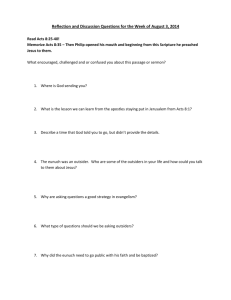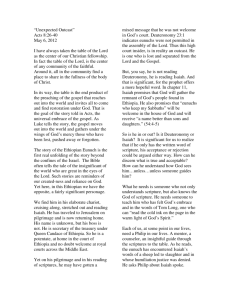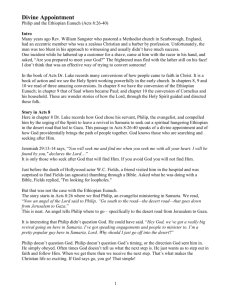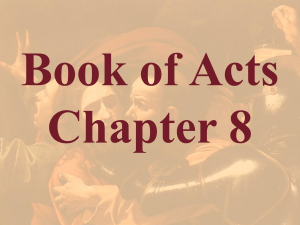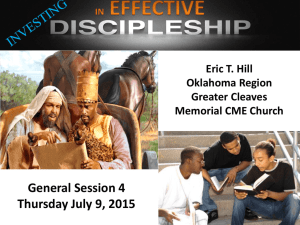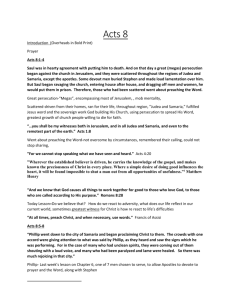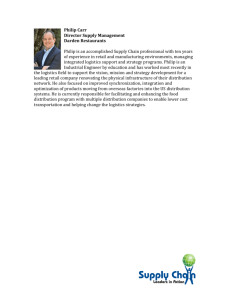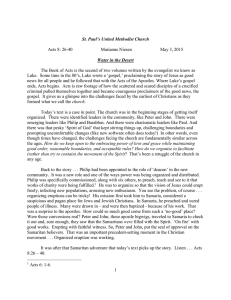Sermons_files/Meditation May 3, 2015
advertisement
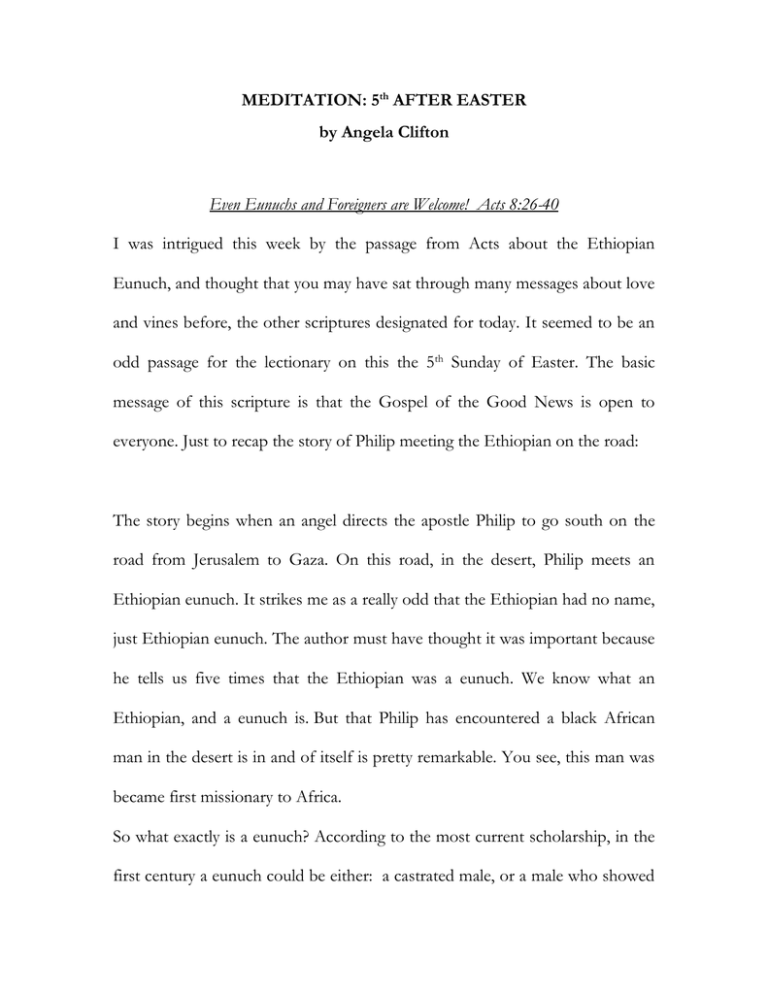
MEDITATION: 5th AFTER EASTER by Angela Clifton Even Eunuchs and Foreigners are Welcome! Acts 8:26-40 I was intrigued this week by the passage from Acts about the Ethiopian Eunuch, and thought that you may have sat through many messages about love and vines before, the other scriptures designated for today. It seemed to be an odd passage for the lectionary on this the 5th Sunday of Easter. The basic message of this scripture is that the Gospel of the Good News is open to everyone. Just to recap the story of Philip meeting the Ethiopian on the road: The story begins when an angel directs the apostle Philip to go south on the road from Jerusalem to Gaza. On this road, in the desert, Philip meets an Ethiopian eunuch. It strikes me as a really odd that the Ethiopian had no name, just Ethiopian eunuch. The author must have thought it was important because he tells us five times that the Ethiopian was a eunuch. We know what an Ethiopian, and a eunuch is. But that Philip has encountered a black African man in the desert is in and of itself is pretty remarkable. You see, this man was became first missionary to Africa. So what exactly is a eunuch? According to the most current scholarship, in the first century a eunuch could be either: a castrated male, or a male who showed a preference for other men or a male who displayed little or no interest in women, or one who was effeminate. I don’t know why this particular man was a eunuch. Eunuchs had three major, and very useful, roles in society. Because it was extremely unlikely that they would father children, eunuchs were often employed as military officers, domestic servants, or treasury officers. Without the responsibilities of children, eunuchs would be fierce soldiers. They were also free to be domestic servants as they were safe to employ around women, and did not need to go home often. Rulers could trust the eunuchs with the treasury as they wouldn’t seek hereditary power. At the time, Ethiopia was a wealthy and sophisticated place. This eunuch was a high court official in charge of the entire treasury of a rich and powerful queen. Now, while rulers entrusted eunuchs with certain key positions, they were considered to be outcasts by the rest of society. The eunuch had come to Jerusalem to worship, and was returning home. According to Deuteronomy 23, which contains the law as it was laid out by Moses, eunuchs were forbidden to worship in the house of God. But, if we were to read the Bible literally, few of us would welcome here in God’s house. The Bible forbids the wearing of more than one type of cloth at the same time – cotton, wool, polyester, linen, spandex – I’m out! According to Leviticus 21:20, anyone who is wearing glasses shouldn’t be here either, because one should not approach the altar of the Lord if they have a defect in their sight. Two strikes! Anyone who works on the Sabbath is out. Any women who are ritually unclean, ought to leave right now, because you are making the rest of us unclean as well. And you men needn’t bother smiling, because any of you who have had the hair around your temples trimmed, ought to know that according to Leviticus 19:27 this is strictly forbidden. And as near as I can tell the penalty for those haircuts of yours is death by stoning. Jesus tells us that the laws of the Old Testament are still valid in the New Testament. Rightly, or wrongly, today, we tend not to take the Bible literarily, otherwise….well, If I took the Bible literally, I’d have to keep my mouth shut, because women are supposed to keep silent in church! And wear hats! But, we believe Jesus’ life, death and resurrection reveal the true nature of our loving and gracious God. We believe that Scripture should be interpreted in the light of the Gospel. We believe the Holy Spirit will direct and guide us. Therefore, guided by the Holy Spirit, we are all welcome here in God’s house, despite our haircuts, our impaired sight, wearing our clothing made of many materials, or the state of our gentiles! Because according to the Gospel, we know that God is love and nothing in all of creation can separate us from that love. All that God wants from us is that we should love God and love our neighbors as we love ourselves. To get back to the Ethiopian: just try telling that to the religious authorities in Jerusalem at the turn of the first century. You can bet that the Black African, gentile, Ethiopian, Eunuch, wasn’t welcome in the Temple. So he left Jerusalem and was on his way back home, riding in his chariot, reading aloud. He must have been annoyed and saddened that he was not welcomed in the temple because he was a eunuch. The Angel tells the Philip to go after the chariot. He heard the Ethiopian eunuch reading Isaiah, because Philip asks him if he understands what he is reading. He must have been having some difficulty because he invites Philip to hop in and explain. The passage the Ethiopian eunuch was reading was about the Suffering Servant of God, who was “cut off” from the people of God. It was no accident he was reading this. Surely, he was trying to figure out why he, himself, was being cut off from the people of God because he had likely also read the neighboring passages where God promised to bless all those who had been excluded and cut off because they were different. Isaiah in 54:1 writes: “Sing, O barren one who did not bear; burst into song and shout, you who have not been in labor!” and do not let the eunuch say, ‘I am just a dry tree….I will give them an everlasting name that shall not be cut off…Thus says the Most High God, who gathers the outcasts of Israel…” In Isaiah 56:4-8 Yahweh declares: “eunuchs who keep the Sabbath and follow the covenant will have an everlasting name and blessing, better even than sons and daughters, an everlasting name that shall not be cut off.” Just imagine how powerful these words were in a time when the whole promise of eternity hinged on having sons and daughters, something a eunuch could never have. It was as if Isaiah was speaking directly to the Ethiopian. Foreigners and eunuchs were supposed to be welcomed at God’s table, despite the fact that the religious authorities were hung up on the rules that were laid out in the days of Moses. The Apostle Philip shared the Good News of Jesus with the Ethiopian eunuch. This Suffering Servant the eunuch was reading about was someone he could identify with. Suddenly the labels that prevented this man from full inclusion in the assembly of the people of God are overcome…and not even the arid desert can defeat them, for suddenly there is some water and the man asks Philip: “What is to prevent me from being baptized?” Well according to the rules of the day, and even some today, Philip should have answered “there’s everything to prevent you from being baptized.” First of all, the Ethiopian eunuch hasn’t confessed his beliefs. He hasn’t even been to confirmation classes. Philip isn’t an ordained minister, one designated to baptize. This is not an emergency and Philip doesn’t even know how to baptize. And the church hasn’t yet approved the baptism of gentiles, let alone foreign black eunuchs. No pastor would baptize you without first attending to the rules. The church needs a little good order. Without the rules where would we be? Surely we can’t just baptize anyone and everyone who asks for baptism. But when the eunuch asks Philip, “What’s to prevent me from being baptized?” Philip jumps into the water and baptizes the man. No, messing around, no consulting the rules, no calling the authorities to see if it is all right. Philip doesn’t answer the eunuch with any of our concerns, he doesn’t ask the Ethiopian if he is an open and practicing eunuch or if he’s a don’t ask, don’t tell, kind of eunuch. He just does it. Nor does Philip qualify his response with reservations, such as: “well, we can baptize you, but we can never ordain you.” Or “well we can baptize you, but we can’t promise never to discriminate against you.” Philip doesn’t share the church’s concerns. And maybe, just maybe, we can learn something from Philip’s radical act. Maybe instead of talking and complicating issues, we ought to just jump into the water and trust the Spirit to take care of the details. According to the story, when they came up out of the water, the Spirit snatched Philip away and the eunuch saw him no more, but went on his way rejoicing. This unnamed Ethiopian eunuch, became the first Christian in Africa, and is the patron saint of Ethiopia. Incidentally, the Christian church in Ethiopia was in existence long before the church in Rome. Ethiopia has one the longest standing Christian communities in the world. Today, most of the people of Ethiopia are Christians. Centuries of Christianity resulted from Philip’s unlikely mission to an Ethiopian eunuch, through the Holy Spirit’s call to cross the traditional boundaries that existed. Those traditional boundaries could be supported by quoting scripture and yet the Spirit prompted Philip to cross those boundaries anyway. The Holy Spirit is guiding us into the world. We are not being sent to condemn, but to offer the benefits of the grace and love of God, so, that in the words of the prophet Isaiah, God’s house will become, “a house of prayer for all people.” A place where there is nothing in heaven or on earth that can separate us from God’s love. So what in the world are we waiting for, let’s jump into the water so that we too can share the love of God with others. Amen.
